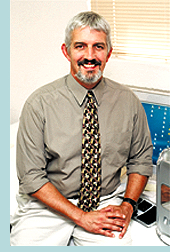 John C. Beier:
John C. Beier:
Local Mission, Global Vision
![]() hen John Beier, Sc.D., was a doctoral student at
Johns Hopkins University in Baltimore, the Baltimore Zoo had a problem.
hen John Beier, Sc.D., was a doctoral student at
Johns Hopkins University in Baltimore, the Baltimore Zoo had a problem.
Penguins were dying of malaria.
Beier and some classmates and colleagues in infectious diseases stepped in to see what they could do. “We figured out some optimal programs to treat sick penguins, and we had different types of mosquito control that we implemented,” says Beier. “Our initial projects were very successful.”
And an infectious disease specialist was born.
Beier came to the University of Miami in 2003 to found the Global Public Health Program within the Department of Epidemiology and Public Health, a big-picture vision to fight vector-borne diseases like malaria.
“One of our first steps involves organizing an international workshop on health diplomacy, which would bring in investigators from around the world, particularly from the Middle East, the Caribbean, and Latin America,” says Beier. The program’s Web site helps with coordination. He also is collaborating with a variety of his colleagues here at UM in fields as diverse as mathematics, engineering, and international health.
Beier, who has seen the toll of malaria and other mosquito-borne illness first-hand while working in Kenya and Egypt, will take all the help he can get. “Malaria kills about two million children a year, mostly in Africa,” he says. The key is a multi-front strategy, including health education, improved drainage, better housing, smarter mosquito control, and medical strategies to reduce the transmission of disease from insect to human.
Having this global health program at UM will help recruit talent. “It also puts us in a really good position to enact some programs in developing countries,” says Beier, including a current project testing mosquito control ideas village by village in Africa. But there are always more needs than resources and Beier is anxious to get more support so his team can implement existing plans. His program is currently funded by the National Institutes of Health.
He knows from experience in Baltimore, at Tulane University, and overseas that one victory breeds others. “People need to be convinced before they take action,” says Beier. “Small success stories go a long way.”